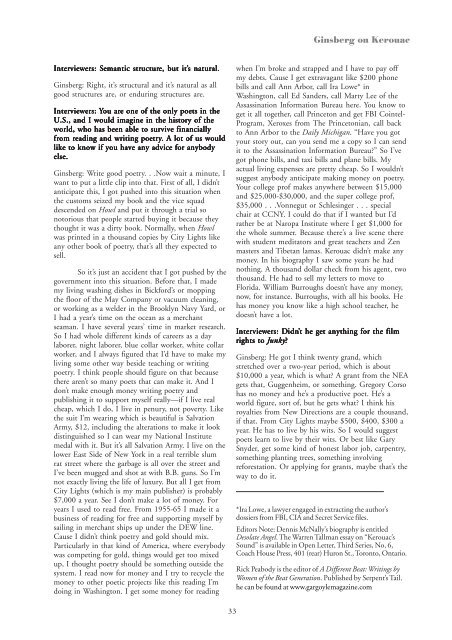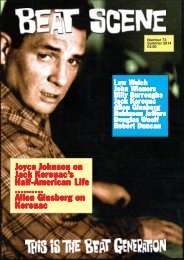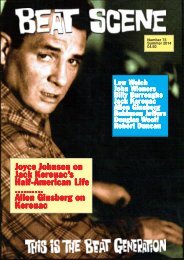Create successful ePaper yourself
Turn your PDF publications into a flip-book with our unique Google optimized e-Paper software.
Ginsberg on Kerouac<br />
Inter<br />
ntervie<br />
viewers: ers: Semantic structur<br />
ucture, but it’s s natural.<br />
Ginsberg: Right, it’s structural and it’s natural as all<br />
good structures are, or enduring structures are.<br />
Inter<br />
ntervie<br />
viewers:<br />
ers: You are e one of the only poets in the<br />
U.S., and I would imagine in the history of the<br />
world, who has been able to survive financially<br />
from reading and writing poetry. . A lot of us would<br />
like to know if you have any advice for anybody<br />
else.<br />
Ginsberg: Write good poetry. . .Now wait a minute, I<br />
want to put a little clip into that. First of all, I didn’t<br />
anticipate this, I got pushed into this situation when<br />
the customs seized my book and the vice squad<br />
descended on Howl and put it through a trial so<br />
notorious that people started buying it because they<br />
thought it was a dirty book. Normally, when Howl<br />
was printed in a thousand copies by City Lights like<br />
any other book of poetry, that’s all they expected to<br />
sell.<br />
So it’s just an accident that I got pushed by the<br />
government into this situation. Before that, I made<br />
my living washing dishes in Bickford’s or mopping<br />
the floor of the May Company or vacuum cleaning,<br />
or working as a welder in the Brooklyn Navy Yard, or<br />
I had a year’s time on the ocean as a merchant<br />
seaman. I have several years’ time in market research.<br />
So I had whole different kinds of careers as a day<br />
laborer, night laborer, blue collar worker, white collar<br />
worker, and I always figured that I’d have to make my<br />
living some other way beside teaching or writing<br />
poetry. I think people should figure on that because<br />
there aren’t so many poets that can make it. And I<br />
don’t make enough money writing poetry and<br />
publishing it to support myself really—if I live real<br />
cheap, which I do, I live in penury, not poverty. Like<br />
the suit I’m wearing which is beautiful is Salvation<br />
Army, $12, including the alterations to make it look<br />
distinguished so I can wear my National Institute<br />
medal with it. But it’s all Salvation Army. I live on the<br />
lower East Side of New York in a real terrible slum<br />
rat street where the garbage is all over the street and<br />
I’ve been mugged and shot at with B.B. guns. So I’m<br />
not exactly living the life of luxury. But all I get from<br />
City Lights (which is my main publisher) is probably<br />
$7,000 a year. See I don’t make a lot of money. For<br />
years I used to read free. From 1955-65 I made it a<br />
business of reading for free and supporting myself by<br />
sailing in merchant ships up under the DEW line.<br />
Cause I didn’t think poetry and gold should mix.<br />
Particularly in that kind of America, where everybody<br />
was competing for gold, things would get too mixed<br />
up, I thought poetry should be something outside the<br />
system. I read now for money and I try to recycle the<br />
money to other poetic projects like this reading I’m<br />
doing in Washington. I get some money for reading<br />
when I’m broke and strapped and I have to pay off<br />
my debts. Cause I get extravagant like $200 phone<br />
bills and call Ann Arbor, call Ira Lowe* in<br />
Washington, call Ed Sanders, call Marty Lee of the<br />
Assassination Information Bureau here. You know to<br />
get it all together, call Princeton and get FBI Cointel-<br />
Program, Xeroxes from The Princetonian, call back<br />
to Ann Arbor to the Daily Michigan. “Have you got<br />
your story out, can you send me a copy so I can send<br />
it to the Assassination Information Bureau?” So I’ve<br />
got phone bills, and taxi bills and plane bills. My<br />
actual living expenses are pretty cheap. So I wouldn’t<br />
suggest anybody anticipate making money on poetry.<br />
Your college prof makes anywhere between $15,000<br />
and $25,000-$30,000, and the super college prof,<br />
$35,000 . . .Vonnegut or Schlesinger . . . special<br />
chair at CCNY. I could do that if I wanted but I’d<br />
rather be at Naropa Institute where I get $1,000 for<br />
the whole summer. Because there’s a live scene there<br />
with student meditators and great teachers and Zen<br />
masters and Tibetan lamas. Kerouac didn’t make any<br />
money. In his biography I saw some years he had<br />
nothing. A thousand dollar check from his agent, two<br />
thousand. He had to sell my letters to move to<br />
Florida. William Burroughs doesn’t have any money,<br />
now, for instance. Burroughs, with all his books. He<br />
has money you know like a high school teacher, he<br />
doesn’t have a lot.<br />
Inter<br />
ntervie<br />
viewers: ers: Didn<br />
idn’t t he get anything for the film<br />
rights to Junky<br />
unky?<br />
Ginsberg: He got I think twenty grand, which<br />
stretched over a two-year period, which is about<br />
$10,000 a year, which is what? A grant from the NEA<br />
gets that, Guggenheim, or something. Gregory Corso<br />
has no money and he’s a productive poet. He’s a<br />
world figure, sort of, but he gets what? I think his<br />
royalties from New Directions are a couple thousand,<br />
if that. From City Lights maybe $500, $400, $300 a<br />
year. He has to live by his wits. So I would suggest<br />
poets learn to live by their wits. Or best like Gary<br />
Snyder, get some kind of honest labor job, carpentry,<br />
something planting trees, something involving<br />
reforestation. Or applying for grants, maybe that’s the<br />
way to do it.<br />
*Ira Lowe, a lawyer engaged in extracting the author’s<br />
dossiers from FBI, CIA and Secret Service files.<br />
Editors Note: Dennis McNally’s biography is entitled<br />
Desolate Angel. The Warren Tallman essay on “Kerouac’s<br />
Sound” is available in Open Letter, Third Series, No, 6,<br />
Coach House Press, 401 (rear) Huron St., Toronto, Ontario.<br />
Rick Peabody is the editor of A Different Beat: Writings by<br />
Women of the Beat Generation. Published by Serpent’s Tail.<br />
he can be found at www.gargoylemagazine.com<br />
33





